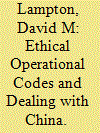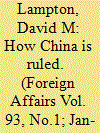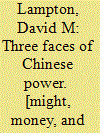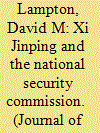|
|
|
Sort Order |
|
|
|
Items / Page
|
|
|
|
|
|
|
| Srl | Item |
| 1 |
ID:
138150


|
|
|
| 2 |
ID:
177657


|
|
|
|
|
| Summary/Abstract |
This contribution argues that, without an ethical operational code, scholars’, policymakers’, businesspersons’, and citizens’ policy positions simply become expedient reactions to
perceived problems, opportunities, and interests. Without
ethical footing, policies as a whole will lack coherence, staying power, and persuasive force. Key elements of an ethical
operational code include: philosophical grounding and core
values, concepts of social and historical development, and
rules of thumb derived from an individual’s experience. Providing several examples of China-related policy issues which
would benefit from the ethical operational code approach,
this essay then discusses the analytic elements of an operational code. It concludes by arguing that, in the context of
US-China relations, individuals should develop ethical constructs characterized by patience, more carrots than sticks,
and more open doors than high walls. In what is emerging as
an increasingly ideologically polarized domestic and foreign
policy circumstance in the United States and in U.S.-China
relations, the starting point for an individual needs to be
self-reflection concerning what they believe and why
|
|
|
|
|
|
|
|
|
|
|
|
|
|
|
|
| 3 |
ID:
077031


|
|
|
|
|
| Publication |
2007.
|
| Summary/Abstract |
Accurately assessing the rise of China is a critical task. Yet U.S. policymakers often overestimate China's military might. And if they continue to view China's power in substantially coercive terms when it is actually growing most rapidly in the economic and intellectual domains, they will be playing the wrong game, on the wrong Þeld, with the wrong team
|
|
|
|
|
|
|
|
|
|
|
|
|
|
|
|
| 4 |
ID:
126273


|
|
|
|
|
| Publication |
2014.
|
| Summary/Abstract |
China had three revolutions in the twentieth century. The first was the 1911 collapse of the Qing dynasty, and with it, the country's traditional system of governance. After a protracted period of strife came the second revolution, in 1949, when Mao Zedong and his Communist Party won the Chinese Civil War and inaugurated the People's Republic of China; Mao's violent and erratic exercise of power ended only with his death, in 1976.
|
|
|
|
|
|
|
|
|
|
|
|
|
|
|
|
| 5 |
ID:
061823


|
|
|
|
|
| Publication |
Stanford, Standford University Press, 2001.
|
| Description |
xviii, 508 p.
|
| Standard Number |
0804740569
|
|
|
|
|
|
|
|
|
|
|
|
Copies: C:1/I:0,R:0,Q:0
Circulation
| Accession# | Call# | Current Location | Status | Policy | Location |
| 049633 | 327.51/LAM 049633 | Main | On Shelf | General | |
|
|
|
|
| 6 |
ID:
065465


|
|
|
| 7 |
ID:
083510


|
|
|
|
|
| Publication |
Berkley, University of California Press, 2008.
|
| Description |
xiii, 361p.
|
| Standard Number |
9780520254428
|
|
|
|
|
|
|
|
|
|
|
|
Copies: C:1/I:0,R:0,Q:0
Circulation
| Accession# | Call# | Current Location | Status | Policy | Location |
| 053925 | 327.51/LAM 053925 | Main | On Shelf | General | |
|
|
|
|
| 8 |
ID:
092158


|
|
|
|
|
| Publication |
2009.
|
| Summary/Abstract |
Though the United States remains atop the world's power hierarchy, it is becoming less dominant, both because of the rise of new power centers and because the problems are becoming larger. The United States now must function in a world of relatively greater power equality and ever-larger problems springing from interdependence. The United States and China now have to look each other straight in the eyes, with the core of their relationship resting on the strategic foundation of stabilization-stabilization of the global economy, global ecosystem, and global security. This essay makes several additional points: (1) China has made some wise domestic and foreign economic policy decisions in the context of the great economic downturn of 2007-2009 that probably will increase the PRC's relative capacities coming out of the downturn; (2) US-China relations are more fundamentally sound than they have ever been before. Both nations' leaders should seize this opportunity to recast their relationship as partners in the effort to build coalitions to address the global system's most pressing challenges; and (3), even with a relatively sound strategic foundation for bilateral relations, when one moves from the general to the specific in important policy domains, it will be exceedingly difficult for Beijing and Washington to reach agreements on how to proceed on many key issues.
|
|
|
|
|
|
|
|
|
|
|
|
|
|
|
|
| 9 |
ID:
140475


|
|
|
|
|
| Summary/Abstract |
This article discusses the rationale for, and progress to date of, creating a National Security Commission in China, a move first announced in late 2013. Central impulses for the Commission's establishment are to help better coordinate a very fragmented bureaucracy and to advance Xi Jinping's drive to consolidate his personal power over the internal and external coercive and diplomatic arms of the governing structure. The Commission is a work in progress and its full institutional maturation will take a protracted period. In the midst of the Commission's construction, there is considerable confusion among subordinates in the foreign policy and security areas about lines of authority and ultimate objectives. Beyond Xi Jinping, it is difficult to discern an authoritative voice. It is an open question as to whether this institutional attempt to achieve coordination will improve, or further complicate, China's long-standing coordination problem, some recent foreign policy achievements notwithstanding. The Commission's focus is heavily weighted toward internal and periphery security, but it also is an institution-building response to new global and transnational issues. It is not self-evident that Xi, or any single individual, can effectively manage the span of control he is constructing.
|
|
|
|
|
|
|
|
|
|
|
|
|
|
|
|
|
|
|
|
|